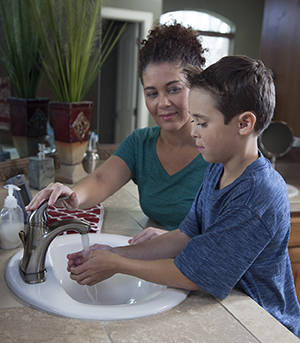A
B
C
D
E
F
G
H
I
J
K
L
M
N
O
P
Q
R
S
T
U
V
W
X
Y
Z
Click a letter to see a list of conditions beginning with that letter.
Click 'Topic Index' to return to the index for the current topic.
Click 'Library Index' to return to the listing of all topics.
Cryptosporidium Infection (Cryptosporidiosis) in Children
Cryptosporidium infection is an intestinal illness. It’s caused by a parasite called Cryptosporidium. This parasite is found in food or water tainted with stool (feces) from infected people or animals. The infection is often passed in tainted water. This most often happens when someone swallows water from a pool, lake, or stream that contains the parasite. It may also be passed through uncooked contaminated foods or foods washed with tainted water.
What are common symptoms of cryptosporidiosis?
Symptoms may appear 2 to 10 days after infection. They include:
Your child can also be infected and have no symptoms at all.
How is cryptosporidiosis diagnosed?
The healthcare provider will examine your child. A stool sample is collected to check for the parasite. More than one stool sample may be needed.
How is cryptosporidiosis treated?
-
The illness can last 1 to 2 weeks.
-
Medicine may be prescribed by the healthcare provider. This clears the infection in most cases. Your child should finish all of the medicine. This is true even if they start feeling better. It’s normal for your child to start feeling better but feel worse again before the illness ends.
-
Don’t give your child antidiarrheal medicine unless told to by your healthcare provider. It can make the illness last longer. It can also decrease the body’s ability to get rid of the parasite.
-
Give your child plenty of water or a children’s electrolyte solution to drink. This helps prevent dehydration. Don't give your child sports drinks. They are full of sugar and are not as good for rehydration.
-
Most children who are not dehydrated should eat normally. Infants can breastfeed.
-
Most children can handle milk products even though they have diarrhea.
-
Complex carbohydrates, vegetables and fruits, lean meats, and yogurt are good food choices.
When to call your healthcare provider
Call the healthcare provider right away if your child:
-
Has severe diarrhea that lasts longer than 2 days
-
Shows signs of dehydration (very dark or little urine, excessive thirst, dry mouth, no tears when crying, or dizziness)
-
Has rapid and excessive weight loss
-
Has blood in the stool
-
Cries and can’t be comforted
-
Seems very tired, slow-moving, or doesn’t respond
-
Has worsening belly pain or vomiting that lasts more than 12 to 24 hours
-
Has a fever that lasts more than 24 to 48 hours
How can Cryptosporidium infection be prevented?
 |
| Wash hands often. This can help prevent the spread of Cryptosporidium infection. |
To prevent your child from passing on a Cryptosporidium infection:
-
Clean your child’s bottom well when changing diapers. Afterward, wash your hands with soap and water. Do the same for your child.
-
Keep your child home from daycare or school until cleared by the healthcare provider.
-
Use alcohol-based hand sanitizers.
To reduce the chances of a Cryptosporidium infection in the future:
-
Don’t swallow or drink water from pools, lakes, streams, or rivers. When camping, or traveling outside the country, don't drink or cook with water unless you know it’s safe. If needed, boil water for at least 1 minute before using it.
-
If you drink well water, have it tested once a year for germs, including Cryptosporidium.
-
Wash your hands with soap and warm water often. Do this before preparing meals or eating food, after going to the bathroom, or handling pets. Teach your child to do the same.
-
Use a food thermometer when cooking. Cook poultry to at least 165°F. Cook pork, beef, and lamb cuts to at least 145°F. Cook ground meats to at least 160°F.
-
Wash or peel produce before eating.
Online Medical Reviewer:
Jen Lehrer MD
Online Medical Reviewer:
L Renee Watson MSN RN
Online Medical Reviewer:
Rita Sather RN
Date Last Reviewed:
7/1/2022
© 2000-2025 The StayWell Company, LLC. All rights reserved. This information is not intended as a substitute for professional medical care. Always follow your healthcare professional's instructions.